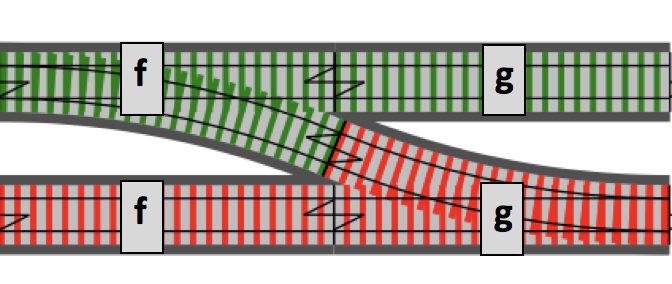Railway Oriented Programming (ROI) is a functional programming pattern that relies on the use of monads to have predictable "tracks" and avoid as much as possible the use of exceptions.
A monad is a "container" that:
- wraps a value
- has the
flatMapoperation
Well known examples of monads in ESM are Mono<T> and Flux<t>.
ROI is implemented by combining functions that return optional types (disjoint unions). The return is usually binary and express the concept that the value can either exist or not. So, instead of:
fun divide(a: Double, b: Double): Double? =
if (b == 0.0) { null } else { a / b }you can write:
fun divide(a: Double, b: Double): Either<String, Double> =
if (b == 0.0) { Either.left("Division by zero.") } else { Either.right(a / b) }In the first implementation you have to check for null values to use the divide function, in the second one you can
just "chain" the function with the next one. If the divide function "succeeds", the next function in the chain will
unwrap the Double and use it as an input. If divide fails, the next function in the chain will simply forward the
String value to the end of the chain.
This model can be of course extended to chain many more function. When any of the functions in the chain fails, the
computation is interrupted and the error, in our case a String will be forwarded to the end and can be used to take
extra decisions or simply for debugging.
Basically, the function (or the chain) always succeeds and the developer must only handle the result, or a error
message (or object), with less need for try/catch and/or if/else blocks. The errors are pushed outside of the
functional core and handled (e.g. logs, alarms) in one spot.
Some use cases for ROI are:
- ETLs
- validations
- reactive processors 🙂
- ...
Divides C by the difference between A and B and add 1,000
fun engineA(a: Int, b: Int, c: Int): Int =
try {
sum(1000, divide(c, subtract(a, b)))
} catch (e: ArithmeticException) {
42
}
private fun subtract(a: Int, b: Int): Int = a - b
private fun divide(a: Int, b: Int): Int = a / b
private fun sum(a: Int, b: Int): Int = a + bThe engine has to rescue the ArithmeticException and return a flag value.
fun engineB(a: Int, b: Int, c: Int): Int =
subtract(a, b)
.flatMap { divide(c, it) }
.flatMap { sum(it, 1000) }
.getOrElse(42)
private fun subtract(a: Int, b: Int): Either<String, Int> =
Either.right(a - b)
private fun divide(a: Int, b: Int): Either<String, Int> =
if (b != 0) Either.right(a / b) else Either.left("B is zero!")
private fun sum(a: Int, b: Int): Either<String, Int> =
Either.right(a + b)Functions are chained with no need for exceptions handling. The exceptions topic is controversial, but I find easier and cleaner to work without exceptions: functions are easier to reason about, tests are easier to implement, better performances, etc.
"Network calls"
fun clientA(url: String): Array<Stock>? =
try {
RestTemplate().getForObject(url, Array<Stock>::class.java)
} catch (e: ResourceAccessException) {
println("Something went wrong: $e) }")
null
}Function can either return null, and we have to check for it, or an empty array, and we need to know what it means,
or throw another exception. Also, we need to check the logs to figure out what happened.
fun clientB(url: String): Either<Throwable, Array<Stock>?> =
Try
.of { RestTemplate().getForObject(url, Array<Stock>::class.java) }
.toEither()When we combine this function with other the computation is halted and the error message propagated.
"Compute the sum of stocks that have been fetched from a remote provider"
fun connectedEngineA(url: String): Double? =
clientA(url)?.sumByDouble { it.price }fun connectedEngineB(url: String): Double? =
clientB(url)
.flatMap { sum(it) }
.getOrElse(0.0)
private fun sum(l: Array<Stock>?): Either<Throwable, Double> =
Either.right(l?.sumByDouble { it.price })In this case vanilla Kotlin feels cleaner than the ROI version, but clientA internally has a try / catch and it
logs (side effect).

